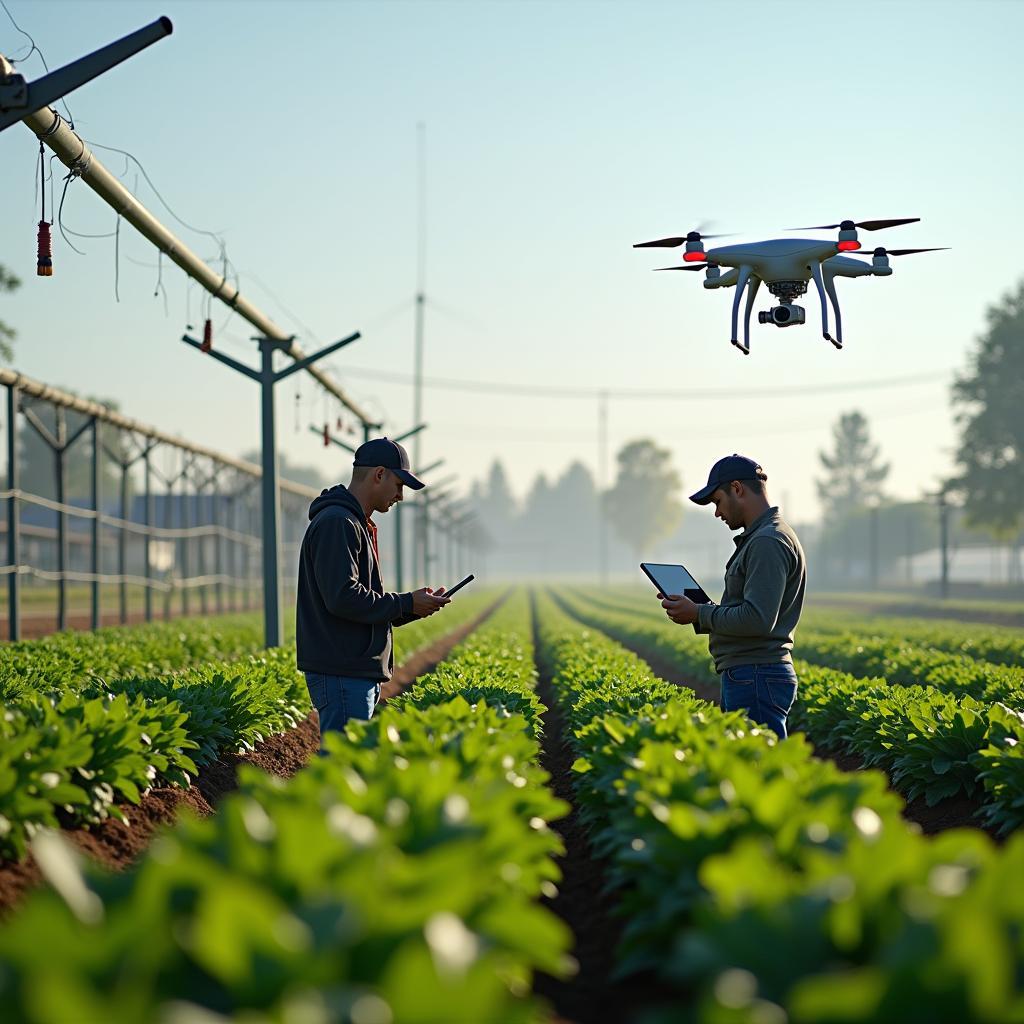The topic of technology in sustainable farming has become increasingly relevant in recent IELTS examinations, appearing in various forms across different test versions. Based on analysis of past papers and current trends, this theme is likely to continue featuring prominently, particularly given its global significance in addressing food security and environmental challenges.
Nội dung bài viết
The benefits of urban farming programs have shown that sustainable agriculture is a growing concern in academic discussions, making it a prime topic for IELTS examination.
Task Analysis
Let’s examine a recent IELTS Writing Task 2 question:
Some people believe that technological advancements in farming are necessary to solve global food shortages, while others think traditional farming methods are more environmentally sustainable. Discuss both views and give your opinion.
Key Requirements:
- Discuss both perspectives on farming methods
- Present and justify personal opinion
- Address environmental sustainability
- Consider global food security

Sample Essay 1 (Band 8.5)
Modern agriculture stands at a crossroads between technological innovation and traditional wisdom. While some advocate for advanced technological solutions to address food security, others champion time-tested traditional farming methods. In my view, a balanced integration of both approaches offers the most viable path forward.
Proponents of technological advancement in agriculture present compelling arguments. Precision farming technologies, including GPS-guided machinery and automated irrigation systems, significantly enhance crop yields while minimizing resource waste. Furthermore, genetic modification techniques can develop resilient crop varieties capable of withstanding extreme weather conditions, which is particularly crucial given the challenges posed by climate change.
However, advocates of traditional farming methods raise valid environmental concerns. Traditional practices often incorporate natural pest control methods, crop rotation, and organic fertilizers, which help maintain soil health and biodiversity. These time-tested techniques have proven sustainable over generations and typically have a lower environmental impact than their high-tech counterparts.
Similar to how urban farming can alleviate food insecurity, I believe the optimal solution lies in combining both approaches. Modern technology can enhance traditional farming methods rather than replace them entirely. For instance, farmers can utilize data analytics to optimize traditional crop rotation patterns while maintaining organic farming principles.
In conclusion, the future of sustainable agriculture depends on our ability to harmonize technological innovation with traditional farming wisdom. This balanced approach can help ensure food security while preserving environmental sustainability.
Sample Essay 2 (Band 6.5)
In today’s world, there is a debate about using technology in farming. Some people think new technology is important for producing more food, while others believe traditional farming is better for the environment.
People who support technology in farming have some good points. Modern machines and computers help farmers grow more food on their land. Also, new technology can help save water and use less pesticides. This is important because we need to feed more people in the world.
On the other hand, traditional farming has advantages too. It uses natural methods that don’t harm the environment. Farmers have used these methods for many years, and they know they work well. Traditional farming also costs less money and doesn’t need expensive machines.
The impact of urban farming on food security demonstrates how both modern and traditional methods can work together. I think we should use both new technology and traditional methods. This way, we can grow enough food and protect the environment.
In conclusion, both modern technology and traditional farming methods are important. We should try to use the best parts of both to solve our farming problems.
Analysis of Band Scores
Band 8.5 Essay Features:
- Sophisticated vocabulary (viable, resilient, harmonize)
- Complex sentence structures
- Clear paragraph organization
- Well-developed arguments
- Coherent progression of ideas
Band 6.5 Essay Features:
- Basic but clear vocabulary
- Simple sentence structures
- Some development of ideas
- Basic organization
- Limited use of complex language
Key Vocabulary
- Precision farming (n) /prɪˈsɪʒən ˈfɑːmɪŋ/ – Using technology to improve crop yields
- Resilient (adj) /rɪˈzɪliənt/ – Able to withstand difficult conditions
- Biodiversity (n) /ˌbaɪəʊdaɪˈvɜːsɪti/ – Variety of plant and animal life
- Sustainability (n) /səˌsteɪnəˈbɪlɪti/ – Ability to maintain ecological balance
- Integration (n) /ˌɪntɪˈɡreɪʃn/ – Combining different elements into a whole
For further practice, consider writing about the role of international trade in economic development and its connection to sustainable farming practices. Share your essays in the comments section for feedback and discussion.